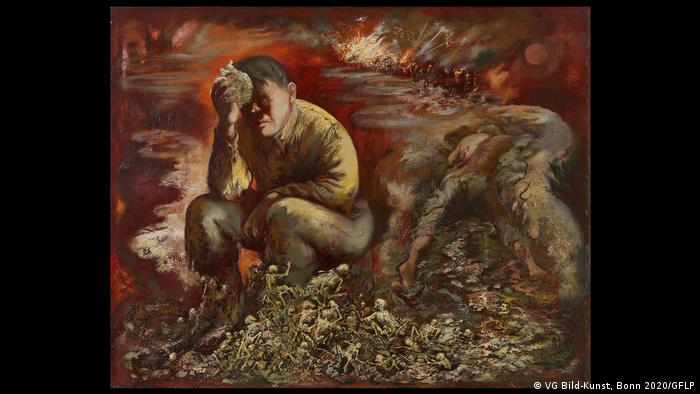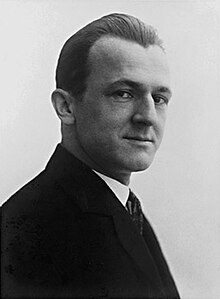Artists
Related: About this forum'Hitler In Hell,' Or 'Cain': Master Painting By German Dada Artist George Grosz Unveiled In Berlin
'The exiled painter described his 1944 work as "Hitler as a fascist monster or as an apocalyptic beast."' After more than 75 years in a private collection, the masterpiece is now in public hands and was unveiled Tuesday. DW, Feb. 4, 2020.
~ According to Grosz's son Martin Grosz, during the 1920s Nazi officers visited Grosz's studio looking for him, but because he was wearing a working man's apron Grosz was able to pass himself off as a handyman and avoid being taken into custody. ~
--------
George Grosz was a pioneer of irreverent Dada art in Berlin, an ardent critic of war and nationalism who went into exile before Hitler seized power in 1933. In 1944, while living in the US, he completed a painting that portrays Hitler as a monster dictator reigning over an underworld of mass death and destruction. Titled Cain or Hitler in Hell, the masterwork has been privately owned (by the Grosz family) since its creation, but in 2019 was acquired by the German Historical Museum in Berlin (DHM).

The painting was officially unveiled today in Berlin, with Minister of Culture, Monika Grütters, Raphael Gross, President of the German Historical Museum Foundation, and Markus Hilgert, General Secretary of the Cultural Foundation of the German Federal States, in attendance. Purchased by the DHM with the support of the federal government and the Cultural Foundation of the German Federal States, the acquisition marks a major coup for the institution as the painting is considered one of the outstanding works created by a German artist in exile after the rise of the Nazi regime.
Hitler in Hell (1944) as it is known, will soon be on view to the public as part of the museum's permanent collection.
..Grosz, who gained a reputation for his highly political Dada art during the Weimar Republic, was a World War One veteran who became a trenchant critic of German nationalism and joined the Spartacist uprising in 1918. As a communist and fierce anti-Nazi who condemned the emergence of fascism throughout Europe, it was no wonder that he emigrated to the US shortly before Hitler came to power in 1933. Soon after, the Nazis labelled his work "degenerate art" and removed it from the public collections in the so-called German Reich.
By the late 1930s, Grosz began to work again in his New York home, reviving many of his former themes as Hitler fomented world war and news of the Nazi death camps spread. Cain or Hitler in Hell is considered one of the main works of this era. Grosz himself described the picture as a representation of "Hitler as a fascist monster, or as an apocalyptic beast, consumed by his own thoughts."
The artist equated Hitler with the figure of Cain, who in the bible is presented as the archetypal murderer and the first in human history.
- Repatriating 'degenerate art':...
More, https://www.dw.com/en/hitler-in-hell-george-grosz-masterwork-unveiled-in-berlin/a-52252359
- DW, New Objectivity Art, the Anti Expressionism Weimar Movement
https://www.dw.com/en/new-objectivity-art-the-anti-expressionism-weimar-movement/a-47433197

- George Grosz' Dada collage, 1918 mocks Prussian generals & religious leaders at the heart of the disastrous Great War.
More, http://www.artnet.com/artists/george-grosz/2
- George Grosz was a German artist and member of the New Objectivity movement. The artist’s paintings, drawings, and prints critiqued the politics and society of his day with incisive humor. “I was arrogant enough to call myself a natural scientist, not a painter, nor, heaven forbid, a satirist,” he once reflected. “But in reality I myself was everybody I drew.." His best-known artworks were depictions of the dark side of German metropolitan life at the time..

- George Grosz, 1921.
https://en.wikipedia.org/wiki/George_Grosz

- 'Myself and New York,' George Grosz, 1957.
lunatica
(53,410 posts)Thanks for posting this and the links. This painting is so intense that it’s hard to look at because it keeps dragging you back to the subject matter which is the carnage. To violent death utterly exposed for what it is and it unapologetically exposes the man who manifested it. In his rendering of reality in art form he makes more of an impact than a photograph would. You don’t need dialogue or a thousand words or an essay to make you understand the truth. You experience it through art, with all it’s conscious and subconscious layers rendered in paint. It’s a more subjective journey into the dark side.
I just spent an hour looking at George Grosz’s art and absorbing it. It definitely makes a disturbing impression of society’s underbelly. Thank you appalachiablue.
appalachiablue
(42,908 posts)and despair in post-war Berlin also greatly influenced his art as well as the Nazi regime. Glad I've time to revisit and learn some more about Grosz. I didn't realize he was in the US and NY after WWII and into the 1950s.
This version is a bit lighter and the details clearer, it's a very powerful statement.
